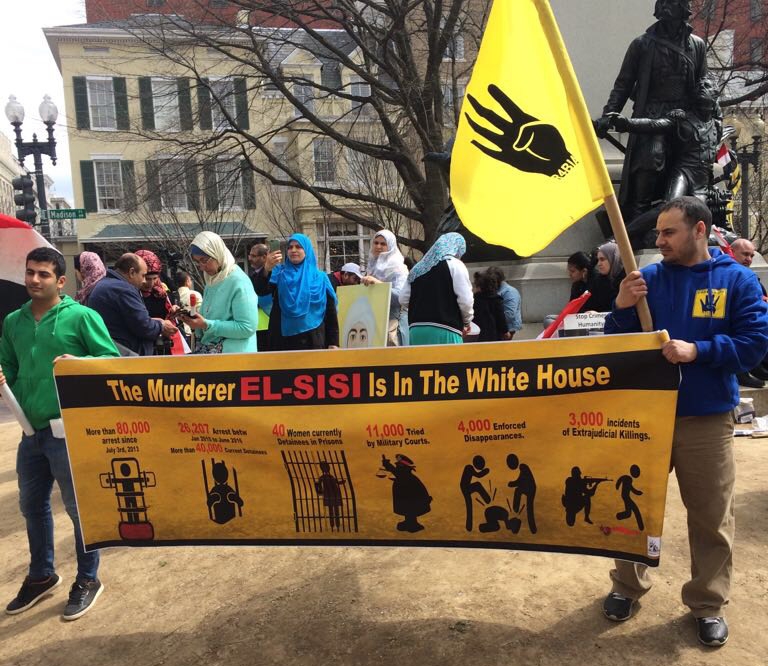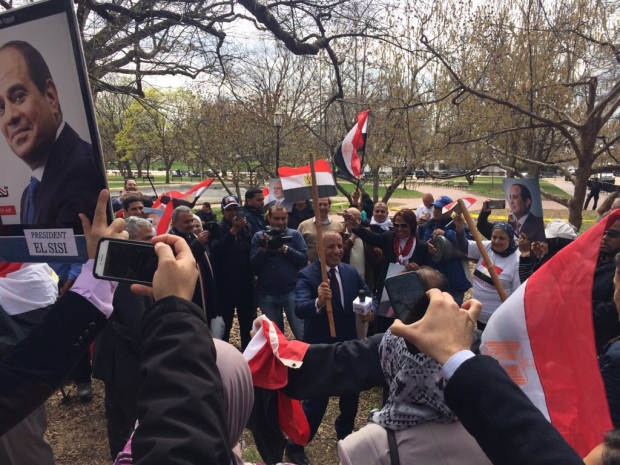ANALYSIS: Sisi visits Washington for military aid

WASHINGTON, DC - Egyptian President Abdul Fattah al-Sisi left the White House on Monday after almost two hours of talks with his US counterpart Donald Trump. Sisi is the first Egyptian president to officially visit Washington after eight years of strained ties with the Obama administration.
Both presidents saw eye-to-eye on countering Islamic militancy in the Middle East and rebooting strategic bilateral relationships. To that end, the Trump administration pledged to provide Egypt with military aid.
“We are building up our military to a level that it will be the highest that we ever had, plane orders, ship orders, aircraft carrier orders, we are rejuvenating our militaries to the highest level, probably more than ever before,” Trump said.
“You will find me and Egypt by your side in implementing the counter-terrorism strategy,” said Sisi, who expressed his admiration for Trump as a unique figure.
Sisi - a former military intelligence general who rose to power after overthrowing Egypt’s elected Islamist president Mohamed Morsi in 2013 - is facing widespread discontent at home, not only for human rights abuses, but also for a crumbling economy, double digit inflation and unemployment rates.
Egypt receives annually $1.3 billion in military aid and $150 million in economic assistance from the US, the second largest receiver of US aid after Israel. For two years, the aid was cut as a result of the military coup against the Morsi government in 2013. In 2015, the aid resumed, yet the Obama administration decided to prohibit Egypt from buying large-scale purchases of weapons in advance.
In response, President Sisi resorted to Europe’s weapon market and purchased major equipment including four German submarines, 24 French Rafale fighter jets, and two French Mistral-class amphibious assault ships.
The Egyptian army currently consists of 470,000 active frontline personnel, 800,000 reserve personnel, a $4.5 billion defence budget and thousands of the most advanced weaponry from Europe, Russia and the US. These capabilities ranked it as the 12th largest military in 2016.
Despite its huge resources, hundreds of Egyptian soldiers have been killed and injured from roadside bombs and attacks at security checkpoints by militants. On average, two or three dozen soldiers and policemen are being killed and injured every month, and the government has imposed a media blackout in order not to negatively impact the morale of the army and people.
Last month, hundreds of Christian Copts fled the Arish area in northern Sinai to Cairo for fear of Islamic State (IS) group attacks. Some locals leaked reports about IS checkpoints in Arish, in an alarming message that Sinai would be “Egypt’s Mosul” according to a term coined by Bahi el-Din Hassan, head of the Cairo Institute for Human Rights Studies.
Analysts in Washington were sceptical about Trump’s ability to designate the Muslim Brotherhood as a terrorist organisation, one of Sisi's main goals at the meeting. Michele Dunne, director of Carnegie’s Middle East programme, said “such designation is problematic for the US administration because the Muslim Brotherhood does not meet the criteria for designation as a foreign terrorist organisation”.
At a panel discussion prior to Sisi’s visit, Dunne said that President Trump has no authority to fully satisfy his Egyptian admirer’s needs, given the cut on foreign aid as part of Trump’s slogan “America First”.
Pro-Sisi versus pro-Morsi
At Lafayette Park, north of the White House, a handful of pro-Sisi supporters, including his media mouthpieces, gathered to act as a counterweight to pro-Morsi and Muslim Brotherhood marchers rallying a few metres away.
Pro-Sisi supporters celebrated by dancing to patriotic songs, raising Egyptian flags and chanting slogans such as “Muslims and Copts are one hand”; “We love you Sisi” and “Raise your head, you are an Egyptian”.
Around 30 metres away, Muslim Brotherhood supporters were marching while holding pictures of Morsi and banners reading “Sisi Must Go”; “Stop supporting the Egyptian killer” and “The murderer al-Sisi is in the White House”.
“Socio-economic hardship fuels the discontent and gives momentum to extremist ideology to grow,” said Moataz el-Fegiery, protection coordinator for the Middle East and North Africa at the human rights group Front Line Defenders in London.
“Sisi’s government has missed the opportunity to fight terrorism because it is using terrorism just to crush civil society and to terrorise the whole nation. No doubt that the US has leverage on Egypt and Sisi is coming here for legitimacy which is declining at home,” el-Fegiery added.
Sisi’s popularity is dwindling in Egypt and his visit is meant to show that the US is on his side against “foes within his regime who might push him away in the next presidential elections scheduled next year,” said Bahi el-Din Hassan, head of the Cairo Institute for Human Rights Studies who lives in exile in France.
New MEE newsletter: Jerusalem Dispatch
Sign up to get the latest insights and analysis on Israel-Palestine, alongside Turkey Unpacked and other MEE newsletters
Middle East Eye delivers independent and unrivalled coverage and analysis of the Middle East, North Africa and beyond. To learn more about republishing this content and the associated fees, please fill out this form. More about MEE can be found here.


